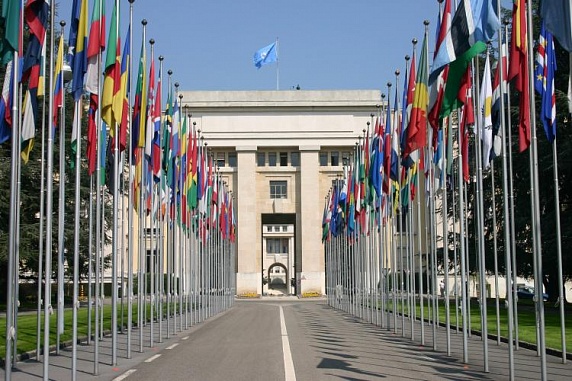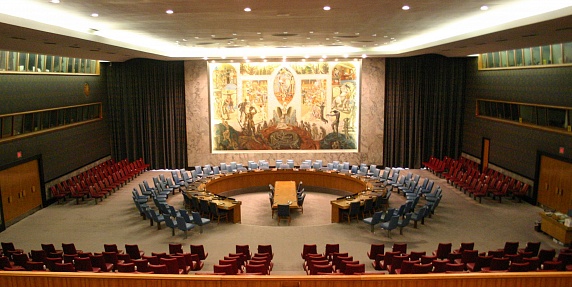 ONU
ONU
Comment by Foreign Ministry Spokeswoman Maria Zakharova on the adoption by the Third Committee at the 77th session of the UN General Assembly of the resolution on combating glorification of Nazism
On November 4, the Third Committee at the 77th session of the United Nations General Assembly in New York adopted the resolution on “Combating glorification of Nazism, neo-Nazism and other practices that contribute to fuelling contemporary forms of racism, racial discrimination, xenophobia and related intolerance,” which was introduced by the Russian Federation.
The resolution was coauthored by another 31 nations: Armenia, Azerbaijan, Belarus, Cambodia, the Central African Republic, China, Cuba, the Democratic People’s Republic of Korea, Equatorial Guinea, Eritrea, Ethiopia, Kazakhstan, Kyrgyzstan, Laos, Malawi, Mali, Nicaragua, Nigeria, Pakistan, the Philippines, Senegal, South Africa, Sri Lanka, Sudan, Syria, Tajikistan, Turkmenistan, Uzbekistan, Venezuela, Vietnam, and Zimbabwe.
105 states voted in favour of the resolution, 52 delegations opposed it, and 15 countries abstained. The resolution once again condemned glorification of the Nazi movement and the whitewashing of former members of the SS organisation, including the Waffen-SS units, which were criminalised by the Nuremberg Trials.
Deep concern was expressed about an ongoing war in some countries against monuments erected in remembrance of liberator soldiers and those who fought against Nazism and fascism, a war that has acquired the nature of state policy in recent years. At the same time, deep indignation was expressed over marches to glorify Nazis and their proxies, and torch processions staged by neo-Nazis and radical nationalists. The same applies to unveiling memorials and renaming streets, schools and other social facilities to glorify those who fought alongside the Nazis or collaborated with them. The resolution also expresses concern over the attempts to make national heroes of those who fought against the anti-Hitler coalition during the Second World War, collaborated with the Nazis, and committed war crimes and crimes against humanity. The resolution emphasises that such actions do injustice to the memory of the countless victims of the Second World War, negatively influence children and young people, and are totally incompatible with the obligations of States Members of the United Nations under its Charter.
Regrettably, since the UNGA adopted the first resolution on combating glorification of Nazism, the above problems have not been resolved. Moreover, they have been exacerbated in many respects. We are witnessing repeated attempts to deny our common history. Racist and xenophobic rhetoric is on the rise, as are calls to get rid of migrants, refugees and “alien elements.” Manifestations of Islamophobia, Christianophobia, Afrophobia and anti-Semitism have become routine in many states.
This year, the adoption of this important document was marred by Western countries’ open attempts to politicise the matter and settle accounts with Russia against the backdrop of the ongoing Ukraine crisis.
This time, the “collective West,” specifically the EU countries, where all the above-mentioned violations occur on a systematic basis, have cast aside the last attempts to cover up their refusal to support the resolution by absurd references to freedom of speech and assembly, and voted against the international effort to combat aggressive manifestations of racism and xenophobia. The positions of Germany and Japan are a matter of special concern. Their pandering to dangerous trends in view of the dark pages in their own 20th-century history raises the question of where the “collective democratic West” is heading.
Moreover, in a bid to distort the meaning of this resolution and square up with Russia for their political failures in the Ukraine issue, the Western countries unsuccessfully tried to disrupt the approval of the resolution and resorted to procedural manipulations, which showed once again their bias and unpreparedness for an honest and constructive dialogue. This was yet another attempt to split the UN member states and complicate international cooperation in combating neo-Nazism, racism and xenophobia.
Nevertheless, the voting results have demonstrated the unfaltering support of the international community for the traditional Russian initiative, which is submitted to the UNGA annually.
We are convinced that the adoption of this thematic resolution will make a significant contribution to the effort to eradicate racism, racial discrimination, xenophobia and related intolerance.









